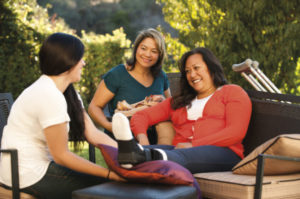This is one of those posts for those who are either noticing they are growing older, or they are dealing with those who have grown older. Aging carries with it a certain amount of jitters. We have all been born. We have all been young. We have all experienced a certain amount of aging. But growing old is a new experience for all of us, and until it has happened to us, none of us really knows what to expect.
The age of addition
I will divide mortality into three stages. The first stage is the age of addition. When we are born we are helpless. We can’t feed ourselves, dress ourselves, or even control our eyes. Speaking, running, and fine motor coordination are completely out of the question.

Young Children
The hallmarks of the very young are their amazing ability to learn new things and gain new skills. From zero to about 12 years of age children are rapidly growing in size and shape. They learn all the basics of controlling their bodies, which is difficult to do because their body size and shape changes on a monthly basis.
During these years the changes include a dramatic increase in size, changes in proportions, the learning of social customs, one or more languages, and expectations about what is right, wrong, good, and bad. These will follow us throughout our lives. We will judge many of our future events by comparing what happens to what we learn as a child, even if we don’t remember that we learned it that way.
From 12-21 years of age we are not only changing in size and stature, shape and features, but we are changing because of the introduction of hormones that affects our behavior and moods. We gain greater independence and abilities to work and make decisions on our own. We move further away from dependency on our parents and family members for safety, and we begin to figure out who we are or want to be as a person in our society.
The age of maturity
Once we have become an adult, even if it is a young adult, those around us begin to treat us with more respect. Life experience molds us and shapes our choices as we choose professions, marry, begin to have a family and have to deal with relationships in ways that no child should ever have to.
 It is in the age of maturity that we come into our own. We can come and go as we wish. We choose our own friends. When we do well in our work outside the home we are often praised and rewarded in monetary ways and with social approval. When we do well in our work within our homes we are rewarded with the admiration of our spouse and or children.
It is in the age of maturity that we come into our own. We can come and go as we wish. We choose our own friends. When we do well in our work outside the home we are often praised and rewarded in monetary ways and with social approval. When we do well in our work within our homes we are rewarded with the admiration of our spouse and or children.
The hallmark of this age group is that everyone relies on us. We are needed. Our boss needs us. Our spouse needs us. Our children need us. We serve in the church and in the community. We don’t receive nearly as much help as we used to when we were children. This is our time to be the givers and changers in our circle of acquaintances. At this age people look up to us and want to be like us. (I’m speaking in very general terms here.)
From 21 until 30 we are still coming into our own. By 25 or so our brains have fully developed, and we are at the top of our physical game. We can work long hard hours and still heal quickly. We can kill ourselves on a project today and be sore for 24 hours then feel fine again. We can go without sleep for long periods of time and recuperate with swiftness. This is a great age for having children because we can handle all those sleepless nights with crying babies.
Something happens about the time we hit the age of 30. One day we eat something at midnight, and instead of our old cast iron stomach, we get indigestion. Weird. That never happened before. Then we notice that after that particularly rough game of softball, we take a half day longer for our aches and pains to subside.
One by one we begin to notice that, though we still feel pretty good, and we look healthy, our bodies are not as spry and agile as when we were in our twenties. We won’t admit that things are changing, but we certainly begin to notice that every once in a while there is yet another unwelcome change that we didn’t see coming. This is what ushers in the age of subtraction.
The age of subtraction
Aging doesn’t happen in a week, a month, or a year. From the time we hit about 30 years of age, our body starts to make a U-turn and head back towards infancy. The problem is, we have already changed into adults, and the body can’t take back, literally, what it once bestowed on us.
 Instead of turning us back into teenagers, preteens, children, and infants, our bodies start to wind down, like a clock. We move more slowly. We start to see bulging where bulging didn’t happen before. We have aches and pains that seem to appear from nowhere and begin to stack, one upon another. It is amazing how many things can hurt at the same time, without one cancelling out the other.
Instead of turning us back into teenagers, preteens, children, and infants, our bodies start to wind down, like a clock. We move more slowly. We start to see bulging where bulging didn’t happen before. We have aches and pains that seem to appear from nowhere and begin to stack, one upon another. It is amazing how many things can hurt at the same time, without one cancelling out the other.
Finally, all that mental agility we took such pride in begins to slip through our fingers. We start joking about having “senior moments” when we are still a long way off from actually feeling like a senior. But the joke is on us, because they continue to come with greater regularity.
If we live long enough we begin to notice that those our age are dying from causes that are supposed to be reserved for “old” people. Some of our friends have passed on through the veil, leaving us with fewer people to turn to for advice and guidance. Our parents can’t be trusted to shovel their walks without imminent threat of broken bones or trips to the hospital.
Our hair has either fallen out or is turning white. Our skin thins and wrinkles appear. Age spots appear. We can’t remember why we walked into the room, but we can remember the details of something that happened ten years ago with amazing clarity. Eventually, we can’t remember what we just ate ten minutes ago, but we can remember details of our childhood 60 years ago.
The Lessons to be learned
Some people fight growing older. Some people look forward to it. Aging is really a mixed bag of blessings, responsibilities, and sorrows. For those of us who are now empty nesters, we have the opportunity to honeymoon all over again. The children are caught up in their own lives, and we are free to serve in ways and places that those with children at home just can’t do. This can be a very exciting time of life.
For those who are moving on and still have parents around, they begin to have to deal with the effects of advancing age. There is constant bouts of difficulties with their bowels. There are the aches and pains accumulated from years of being often irresponsible with their bodies. Joints hurt, eye sight goes to pot, and memory is ever more elusive.
What is left of us when all of this goes away? What once was a vibrant and energetic individual, full of talent and capacity, has become a drooler in a convalescent home. The person we all looked up to and wanted to be like now wears adult diapers and needs help being fed.
Final Thoughts
 The lessons we need to learn, and these are the some of the most difficult in mortality, center around our bodies. When we have reached the zenith, the pinnacle of our physical and social development, we sometimes get caught up in our own abilities. We tend to lose our dependence on the Lord. We forget that we NEED to depend on Him.
The lessons we need to learn, and these are the some of the most difficult in mortality, center around our bodies. When we have reached the zenith, the pinnacle of our physical and social development, we sometimes get caught up in our own abilities. We tend to lose our dependence on the Lord. We forget that we NEED to depend on Him.
We need to remind ourselves of what we are allowed to take with us when we leave mortality. All we can take with us into the spirit world, and into the resurrection, is what we have become. I’m not talking about how physically strong we have become, or how powerful a leader we think we are.
What we have become is a very simple thing. It can be defined by how much we have learned to love, how much we have learned to trust in our Father in Heaven, how well we have learned to follow the Spirit, and how deeply committed we are in becoming more like Christ.
When all is said and done, these attributes are all we can take out of this world. Mortality is like a sandbox. God owns the sandbox and all the toys in it. We come and play for a time, and perhaps even forget that our toys don’t belong to us. But when we are called by our parents to go home, everything stays in the sandbox. We go home empty handed. The only thing we get to take with us is the person we have become.
Growing old gracefully is difficult. Some of us become angry at the losses we feel as our bodies deteriorate and our mind wanders more frequently. But we need to remember that we are not here permanently. Earth life is a temporary condition to prove what kind of life we want for the rest of eternity. If we spend all our time chasing the pleasures of this life then we will be denied the pleasures available to those who took this test more seriously.

To read more of Kelly Merrill’s articles, click here.
As I reminded my own mother, who recently broke her leg, and is now distressed because she has lost half of her stamina, “Mom, you are 81 years old, that is why you lost your stamina. This is what happens when you are injured at your age.” Those are hard words to hear, and hard words to say. I will be in the same position soon enough. Will I be able to recognize then what I can see now, that what matters most is not what I can do, but what I have become? I guess only time will tell.
About Kelly P. Merrill
Kelly Merrill is semi retired and writes for https://gospelstudy.us. He lives with his wife in Idaho. His strength is being able to take difficult to understand subjects and break them down into understandable parts. He delights in writing about the gospel of Christ. Writing about the gospel is his personal missionary work to the members of the Church and to those of other faiths who are wanting to know more about Christ's gospel and His Church.







Thank you for your perspective and beautiful insight. Your words made me think, “what have I become? Am I doing my best? Do I have any regrets? Am I committed to become more Christlike?” Thank you for sharing.
Ahhhhh….gives me something to think about in my dotage! Your Mom